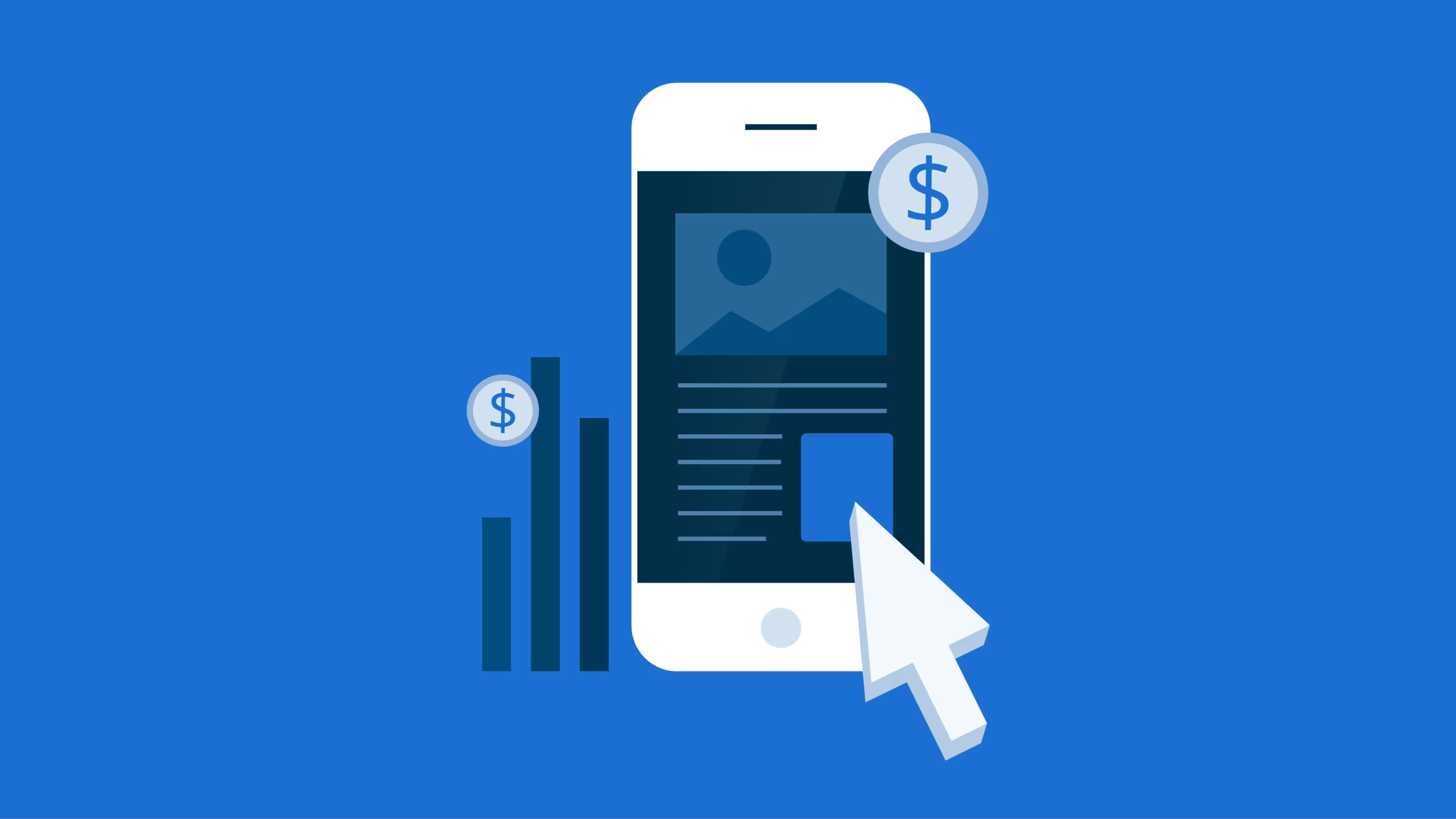Exploring PPC for the first time? Start strong using the information below.
Do you own or work to promote a small to midsize business that’s ready to explore PPC advertising for the first time? Even with new marketing tactics appearing seemingly every day, this tried-and-true format for getting your message to the right people at the right time remains a crucial piece of the overall sales and marketing puzzle.
In fact, according to Capterra’s 2022 Email and Social Media Marketing Survey, 51% of small business marketers agree that digital advertising is critical to their business overall success with a further 33% deeming it extremely critical[*].
If you’re diving into this topic for the very first time, we’re here to help you understand how PPC fits into the bigger picture. Below, we’ll share what pay-per-click management entails, relay the benefits of PPC, and provide info on tools that can help you along the way.
Essential Tech Every Marketer Needs to Be Successful
What is PPC management?
Pay-per-click (PPC) management is the process of overseeing a company’s advertising spending. This involves planning, executing, and optimizing paid ad campaigns with the goal of promoting effective results while simultaneously reducing costs.
Searching for a PPC agency to hire for your business? We’ve got you covered. Check out our list of companies in the following areas:
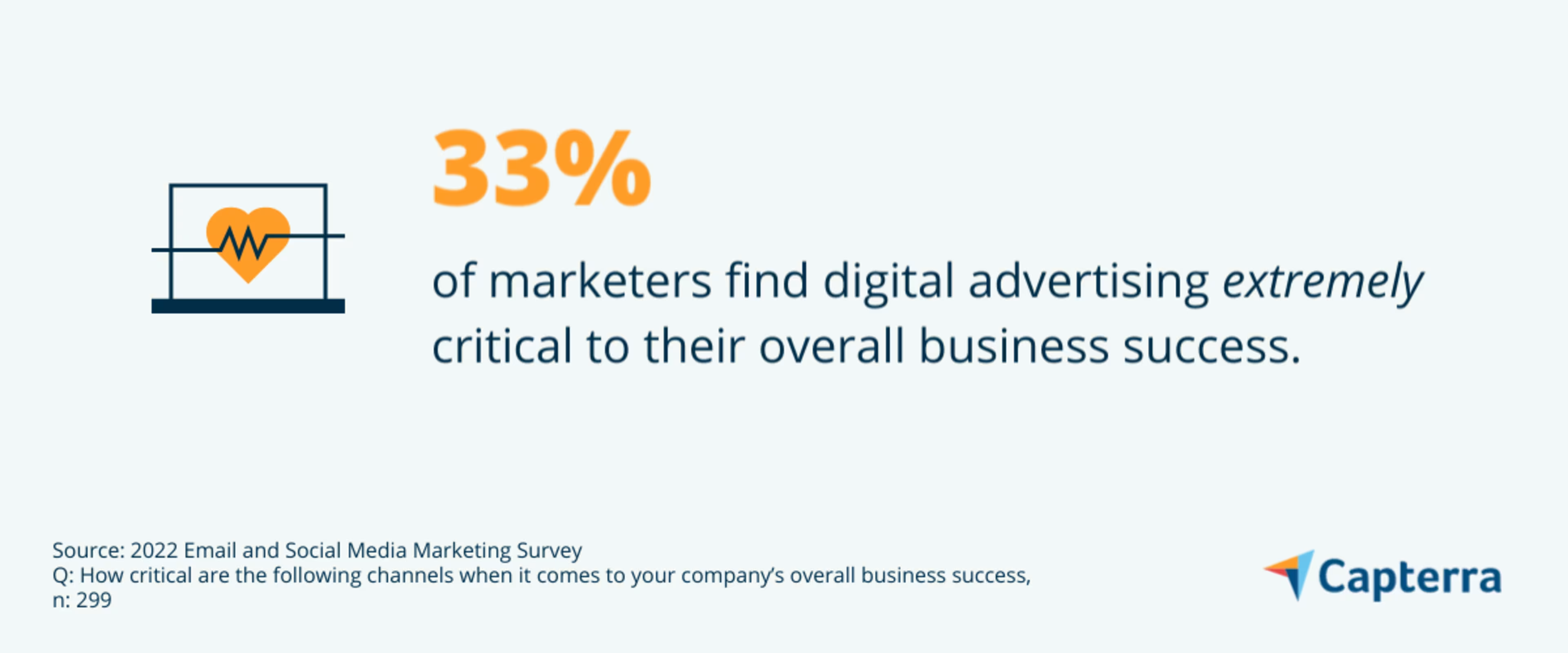
As one of the more basic and traditional marketing and advertising tactics, any company can stand to benefit from effective PPC advertising. Before we dive into the components of successful PPC management, let’s first discuss the main benefits.
Benefits of pay-per-click advertising
There are a few distinct benefits to effective PPC that may get more mileage than you realize. Let’s look at a few of those now as well as what types of businesses stand to benefit the most.
Improved SEO results
Even a passingly well-optimized PPC strategy can make a real impact on your small business’ SEO efforts. Properly curated and placed ads serve to increase organic traffic in addition to the paid results which ultimately leads to increased revenue.
Businesses in the beginning stages of increased growth especially stand to benefit from this complementary strategy. The double duty achieved by combining SEO and advertising work is a boon to SMBs with limited resources. Newer organizations based in ecommerce and retail as well as those with niche subject matter expertise are primed to take advantage of this combo.
Increased brand awareness and engagement
Effective use of PPC also serves to increase brand awareness and even engagement by boosting an organization’s search engine results and honing in on its target audience on social media. Placements like banner ads and sidebar ads can occupy prime real estate on well-trafficked sites, and targeted ads using search history and other firmographic info have a better chance of reaching audience members who are likely to convert.
Newer businesses with the main goal of establishing their online presence to build brand awareness should be especially aware of this benefit. With a carefully planned campaign, you can reach a high quality audience with relatively little ad spend using demographic info, firmographic info, and tactics like lookalike audiences.
More cost-effective results
By design, a business only pays for results when a user clicks on a PPC ad. This leads to more cost-effective results because you only spend for people who are actually visiting your page and are thus more likely to convert.
Small businesses with more-limited ad budgets should consider PPC marketing for this reason. Instead of targeting for awareness or views—metrics that can oftentimes end up being for vanity more than anything—you can be more confident that the results you’re getting are likely to lead to repeat interactions with a consumer (or even a conversion from the outset).
Streamlined marketing and advertising processes
Proper PPC management includes everything from campaign ideation and asset creation to keyword research, budget management, and A/B testing of ongoing content. As you can tell, there are a lot of components to successful PPC management. When you embark on this process and learn more about managing your campaigns, you’ll be able to use what you learn to impact all these areas, likely within the same PPC software.
If you’re a small to midsize business with a limited tech stack, having tools that aid in a variety of tasks provides a huge benefit in the sense that you only pay for one tool that can perform multiple functions. We’ll discuss more of what PPC software can do for you at the end of this article.
The components of successful PPC management
Now that you’re familiar with the benefits of PPC marketing, what does it take to develop a successful program? Below you’ll find the key tactics of effective PPC ads and how to get started utilizing them.
Keyword research
Keyword research for search engine marketing (SEM) purposes is crucial for effective PPC management. This process involves choosing the right keywords for PPC ads to reach your intended audience. Selecting appropriate key terms and phrases gives your ad campaign a better chance of appearing in search results which in turn leads to more engagement and (hopefully) conversions.
/ Getting started with this tactic
There are many free SEO tools out there to get your feet wet with keyword research. It’s a learning process, but even with no budget you can still make an impact starting from scratch. As you progress, you may consider adopting paid SEO software to further bolster your efforts.
Channel strategy
When crafting a PPC campaign, one of the more basic yet more important aspects is which channels you’ll post your ads on. This is often determined by the type of product or service you’re promoting, where you can expect to find your audience, and the cost for a given platform.
/ Getting started with this tactic
Channel strategy is something you are likely engaging in whether or not you’re currently utilizing paid ads. Parlay the knowledge you’ve gained from organic research to your paid tactics, targeting channels and platforms where your users spend the most time.
If you have yet to do this type of research, conduct an audit of your online presence as well as competitive research (more on that below) to discover fertile ground for promoting your message.
Campaign monitoring
A crucial aspect of conducting successful PPC campaigns is monitoring those campaigns once they are live. This process involves monitoring the results you’re getting vs. your ad spend, tracking which keywords an ad is activating to further optimize your SEO, and monitoring the flight time (how long your ads are running).
/ Getting started with this tactic
Whether you use PPC management software or platform-specific features e.g., Facebook or Twitter ads, you’re able to monitor campaign performance on a day-to-day level. Utilize features that give you insight into SEO performance, A/B testing to iterate on your creative assets, and budgetary features to optimize your spending as you conduct campaigns.
Competitive analysis
Alongside channel strategy, competitive analysis involves seeing what your competition is doing online to take advantage of underutilized niches in the form of keywords and digital marketing channels. This analysis also includes seeing what’s working for them so you can emulate successful strategies for your own business (where applicable).
/ Getting started with this tactic
Keep your finger on the pulse of what your competition is doing. Follow on social media, subscribe to newsletters, and pay attention to where you get served their ads. Note things like the ad format, what details are included in the ad copy, and where links take you. If you have a digital marketing service provider or PPC agency as a partner, they can also help you conduct this research.
Technology to help you better manage PPC
PPC software
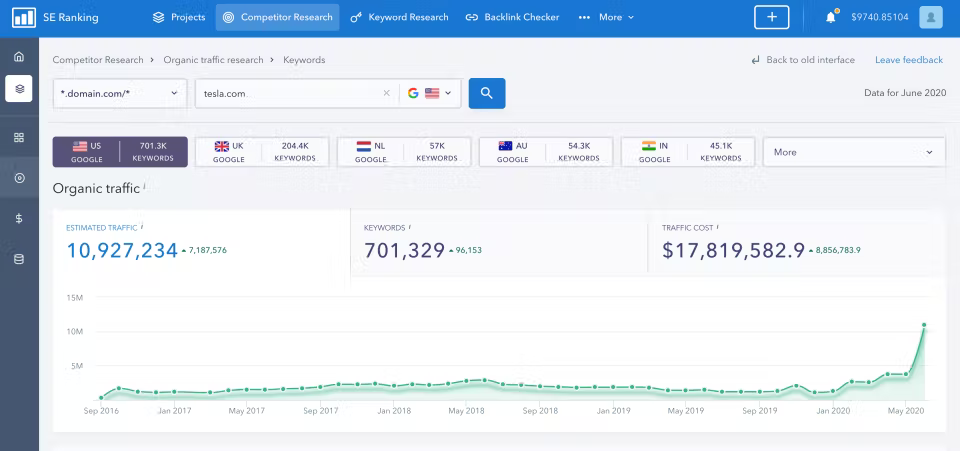
An example of a competitive research dashboard from SE Ranking (Source)
Pay-per-click software, as the name implies, deals with all things PPC. From campaign creation and monitoring to competitive analysis and preventing fraudulent clicks, PPC software is designed to aid in managing your PPC efforts from beginning to end. Other aspects these tools help with include: account audits, custom workflows, and automated functionality.
Visit Capterra’s PPC Shortlist for a quick view into top performers and emerging favorites.
CRM software
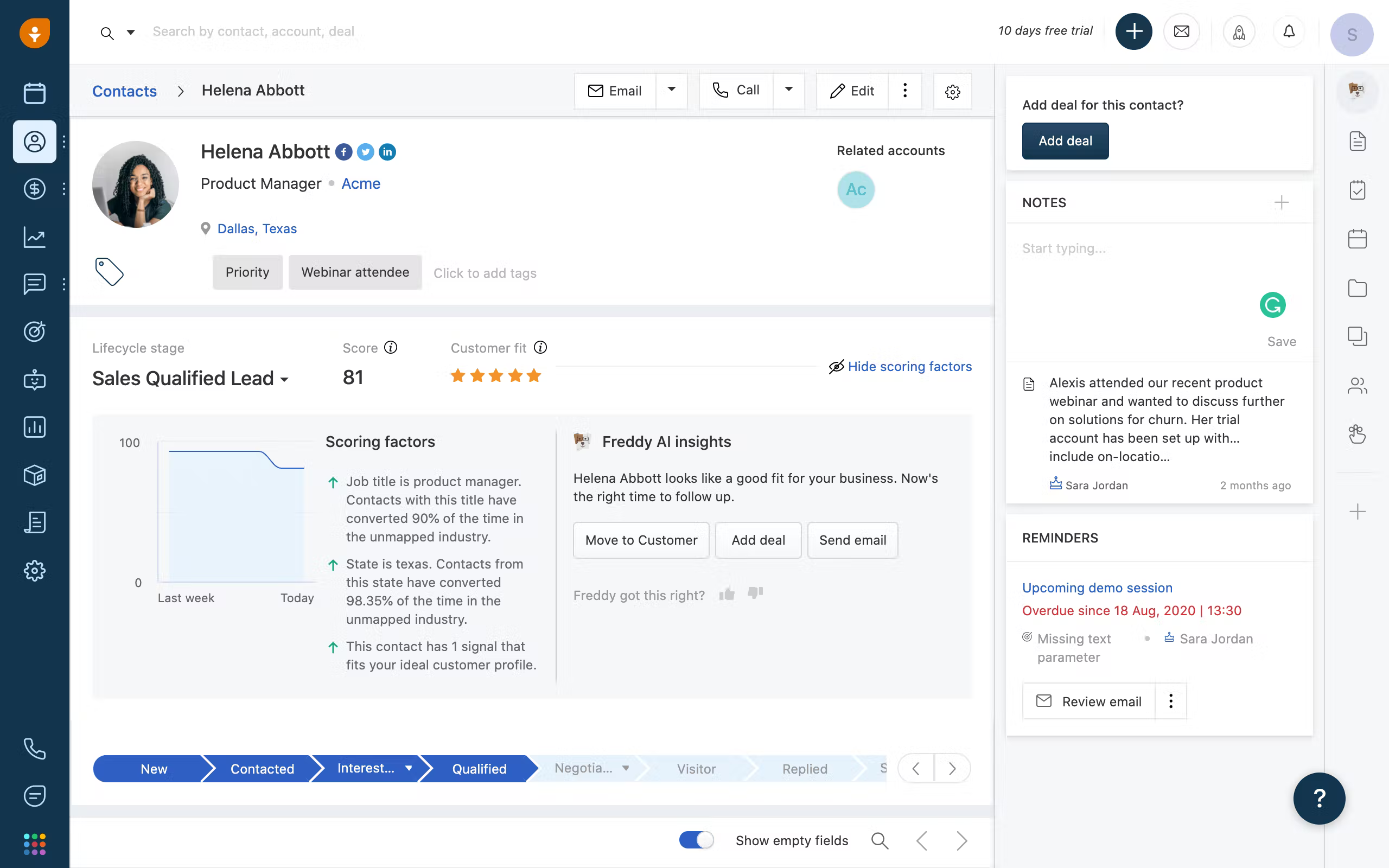
An example of contact data within a CRM platform from Freshsales (Source)
CRM platforms aid in PPC management by allowing for different roles and teams within your organization to access important customer information. Info stored in a CRM can be used to enhance audience segmentation efforts. With these platforms, users can also create lookalike audiences to more easily target potential customers in the future.
Visit Capterra’s CRM Shortlist for a look at who we’ve identified as top performers and emerging favorites. You can also visit our CRM Software Buyer’s Guide for a wealth of info on cost, features, integrations, and more.
Campaign management software
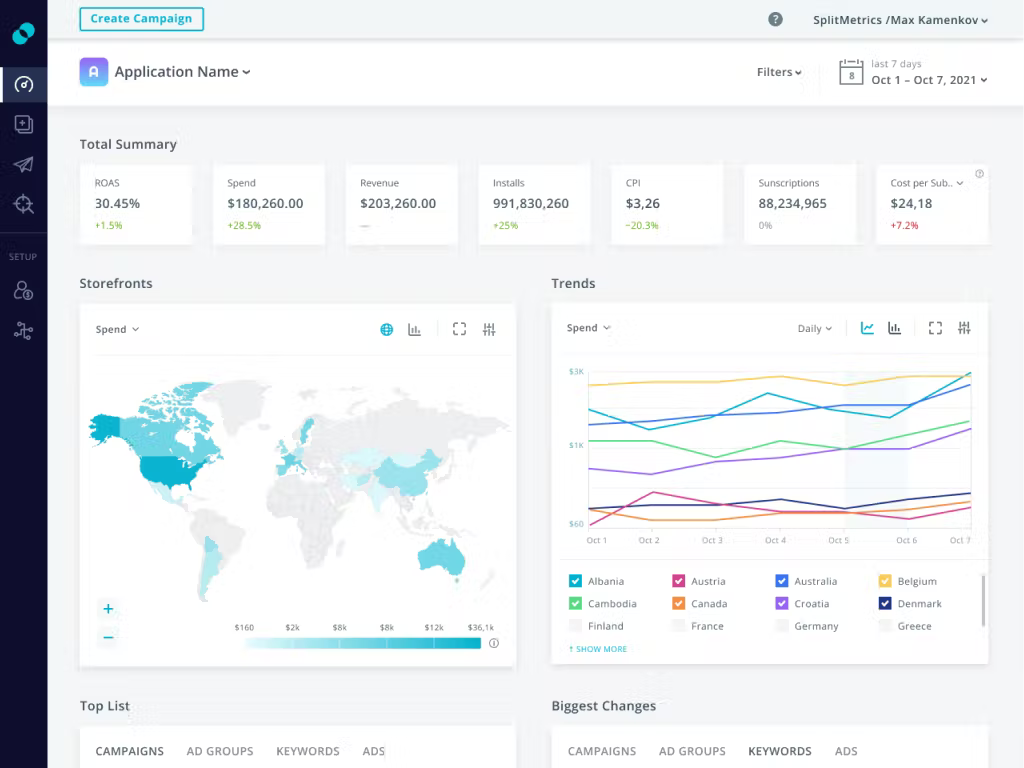
An example of real-time campaign analytics from SplitMetrics (Source)
Campaign management software deals directly with the details of live campaigns. Providing real-time analytics and customer segmentation opportunities, PPC campaign management software allows you to make changes to campaigns mid-program. This type of software is most useful for businesses that run multiple PPC campaigns at a time.
Check out Capterra’s Campaign Management Software Shortlist for more information on the best solutions we’ve identified.
PPC is here to stay, and now you’re ready to take advantage
PPC may seem traditional in the face of new advertising and marketing developments, but the fact of the matter is that its use is still on the rise. In fact, according to Gartner research the use of PPC has increased 14% from 2021 to 2022[1].
This type of growth is a good indicator PPC isn’t going anywhere and that a solid paid strategy is instrumental to achieving goals for businesses both big and small. For more information on marketing and advertising your small business, get started with these resources on the Capterra blog:
Note: The applications selected in this article are examples to show a feature in context and are not intended as endorsements or recommendations. They have been obtained from sources believed to be reliable at the time of publication.
